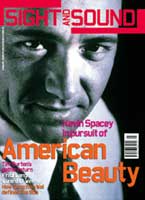Primary navigation

UK 1999
Reviewed by Kieron Corless
Our synopses give away the plot in full, including surprise twists.
Scotland, the present. Janice Beard's mother Mimi developed agoraphobia from the shock of her husband dying at Janice's birth. Janice has since constantly invented stories to entice Mimi out of the house but to no avail. Janice leaves for London hoping to earn enough for a cure. Violet, a childhood friend, secures Janice a temp's position at Kendon Cars who are on the verge of launching a new model. Janice makes videotapes of her colleagues to send to Mimi, unwittingly capturing office junior Sean in the act of pilfering secret documents to pass to Kendon's rivals. Sean and a smitten Janice go on a date, during which he retrieves the incriminating videotape.
Janice is duped by Sean into signing documents which will dispatch the new car to a crusher's yard. When the car is discovered missing on the morning of the launch, Janice is interrogated. She realises Sean tricked her but the only proof is on a videotape she sent her mother. Company officials recover the videotape but, suspecting Mimi is involved, force her to accompany them to London. Under hypnosis, Janice remembers the address of the crusher's yard. She evades her interrogators and heads there, running into a now guilt-stricken Sean. They drive the new car to the launch, arriving in the nick of time. Sean is arrested. Janice is reunited with Mimi whose agoraphobia has finally been cured.
Director of the shorts Daphne & Apollo and Symbiosis, Clare Kilner in her feature debut has her quixotic heroine Janice Beard move from her small Scottish hometown to alien London. While temping, Janice becomes the unwitting dupe of Sean, an Oxbridge-educated industrial spy masquerading as an office-boy geezer. This unlikely character enables co-writers Kilner and Ben Hopkins to graft romance and a crime-caper plot on to what is essentially light comedy. With her tall tales, Janice bears more than a passing resemblance to the eponymous hero of Billy Liar (1963). Where Billy resorted to fantasies to escape a humdrum reality, Janice's inventions are much more scaled-down, inextricably linked to low self-esteem and her mother's agoraphobia. But the film is least convincing when asking us to believe in Janice's extraordinary transformative impact on others. Despite her own dowdiness, she becomes the typing-pool fashion guru and Sean is improbably smitten by her wide-eyed lack of sophistication. Even Julia, her nightmarish supervisor, is compelled to recognise the error of her ways.
On the other hand, the video messages Janice sends her mother work well precisely because they're so transparently fake, yet important within the film's only credible, involving relationship. They supply some genuinely funny moments. We watch Janice through her video camera's eye as she bustles about her flat's dream kitchen until a perfectly timed cut reveals she's in a showroom. When it gently debunks Janice like this and exercises restraint the film is persuasive. The romance with Sean, for example, is wisely downplayed at the end, and Janice's first-ever sight of her mother outside their home is movingly low-key. The office scenes are the weakest element, and thoughts inevitably turn to Mike Nichols' comedy drama Working Girl which also focused on the interactions of female office workers but with far greater panache and comic insight. Here the dialogue isn't fast-paced, perceptive or funny enough to sustain interest and virtually every character is a stereotype. The script feels comfortable only when dealing with plot mechanics, so the pace finally picks up when Sean's sabotage is discovered.
One success is the discovery of newcomer Eileen Walsh. Her mobile facial expressions and emotional range make other, more experienced cast members seem wooden. It's good to see someone playing a temp who possesses such a winning ordinariness. On the whole Janice herself is an endearing, eccentric creation but the film lacks the sharpness that might capture the public's imagination as Billy Liar did back in the early 60s.